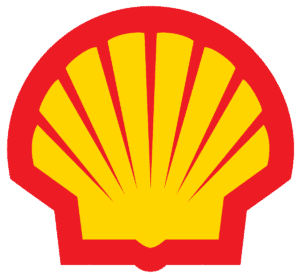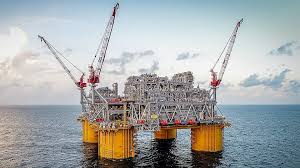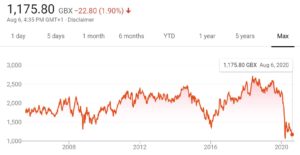How to Buy Shell Shares Online in the UK
Royal Dutch Shell is the largest energy company in the world and one of the top 10 highest-grossing companies in the world in any industry. This oil producer has long been a darling of investors, but it’s been hit hard in the past year by an oil surplus and dramatically declining energy demand.
For UK investors, the drop in Shell’s share price could be an opportunity. This company has traditionally paid out a significant dividend, and even after a recent cut its still payout out a solid yield to investors.
If you’re considering investing in Shell, this guide is for you. We’ll show you how to buy Shell shares online in the UK and highlight two of the top brokers you can use for the job. We’ll also take a closer look at Shell’s prospects for the future to help you decide whether it’s a smart investment right now.
Step 1: Find a UK Broker That Offers Shell Shares
 Shell is headquartered in the Netherlands but incorporated in the UK, and it trades on the London Stock Exchange. That means that most online UK stock brokers offer trading on Shell shares without requiring you to jump through any hoops.
Shell is headquartered in the Netherlands but incorporated in the UK, and it trades on the London Stock Exchange. That means that most online UK stock brokers offer trading on Shell shares without requiring you to jump through any hoops.
Of course, it’s still important to get the right broker for trading. Your share broker will control everything from how much it costs to trade to what tools and charting software you’ll have available for research.
To make your choice easier, let’s take a look at two of our top recommended online brokers in the UK.
1. IG – Spread Betting, CFDs, and Share Dealing for 16,000 Shares
 IG is one of the most well-established brokers in the UK, with a history dating all the way back to the 1970s. This broker offers unparalleled access to the global share market. With IG, you can trade more than 16,000 global shares through share dealing, CFD trading, or spread betting accounts. On top of that, IG offers access to investment trusts, ETFs, mutual funds, forex, indices, and commodities. It’s easy to build a diversified, robust portfolio with this online broker.
IG is one of the most well-established brokers in the UK, with a history dating all the way back to the 1970s. This broker offers unparalleled access to the global share market. With IG, you can trade more than 16,000 global shares through share dealing, CFD trading, or spread betting accounts. On top of that, IG offers access to investment trusts, ETFs, mutual funds, forex, indices, and commodities. It’s easy to build a diversified, robust portfolio with this online broker.
The only catch is that trading with IG isn’t fully commission-free. Buying shares of UK stocks like Shell outright costs £3 per trade. For CFD trading, IG doesn’t charge any spreads, but you will face a commission of £10 per trade. These charges can add up over time, so we recommend IG most highly for long-term investors who don’t place a large number of trades.
Costs aside, IG offers one of the most powerful trading platforms available from any UK broker. You get access to ProRealTime, a comprehensive charting and analysis software that enables you to create fully custom strategies and backtest them to boost performance. You also get access to one of the best trading apps we’ve seen and trading signals to help you stay on top of the market. For advanced traders, IG even offers the possibility of automating a custom trading strategy.
Pros:
Cons:
Shell has long been a favourite dividend stock among investors. But before you dive into buying shares of this oil giant, it’s important to closely look at where it has been in the past and where it is going in the future. A lot about Shell’s economic prospects have changed in the past year, so it’s critical that you approach Shell shares with caution and a clear strategy. Royal Dutch Shell PLC, colloquially known as Shell, was formed in 1907 when the Netherlands’ Royal Dutch Petroleum Company and the UK’s Shell Transport and Trading Company combined. Uniquely, the merger wasn’t total until 2005 – for nearly 100 years, the UK and Dutch businesses were maintained as separate legal entities in their respective countries but operated as a single-unit partnership. Shell has a long and sordid history, as do many of its rival oil and gas behemoths. The company was linked to a war in Oman in the 1950s, has faced human rights violations for its treatment of indigenous peoples in Africa, and has caught the ire of environmental groups for its focus on drilling in the Arctic. While Shell has not suffered a catastrophic oil spill like some of its rivals (including BP and Exxon), the US’s Bureau of Ocean Energy Management has singled out the company as likely to cause a massive oil spill in the Arctic within the next several decades. Shell, along with other oil companies, has enjoyed massive growth over the past 15 years thanks to the development of hydraulic fracturing and horizontal drilling technology. The company has not only increased its oil output several-fold, but also became the world’s largest producer of liquefied natural gas after a 2016 acquisition of gas producer BG Group. That acquisition came in the midst of a short-lived downturn in oil prices, which brought the Shell share price from a high of £2,450 to a low of £1,350. Shell’s share price started 2020 at around £2,300, but the coronavirus pandemic combined with a global price war over oil led by Saudi Arabia wreaked havoc on the company’s finances. At one point, analysts estimated that global oil reservoirs were within days of filling up and the price of oil futures contracts in the US turned negative. The Shell share price reached a pandemic low of just £970 in mid-March. To make matters worse, Shell announced a massive 66% dividend cut in late April 2020. This came after more than 75 years of steady dividend growth and caused the stock price to dive an additional 10%. Today, Shell’s price is sitting around £1,175 per share. For decades, Shell was considered one of the best dividend stocks in the world. The company hadn’t cut its dividend since the end of World War II and had made good progress in growing it over time. The dividend yield was almost always over 6% and reached levels as high as 10% per share during the dip in oil prices in 2016. That all changed in 2020. After a worst-case scenario for oil prices – a global economic shutdown paired with a price war over oil – Shell would have paid out a 16% dividend yield had it not made cuts. Worse, it was almost certain that the company would have had to take on debt to make the full payout to investors. Rather than allow that to happen, Shell slashed its dividend by 66%. The dividend yield now sits at around 4%. That’s still a respectable dividend yield, but investors remain wary – rightly so – that the dividend won’t be cut again. Shell lost more than £2 billion in profits in the first quarter of 2020, and the company’s leadership is clear-eyed about the fact that oil prices are unlikely to rise enough in the next few years to keep the dividend safe. Things aren’t looking good for Shell’s share price. The company – and most analysts – don’t expect oil prices to rebound to above $55 per barrel (the average 2019 price) until at least 2022. If global tourism and the aviation industry don’t bounce back quickly, oil prices could remain suppressed for even longer. Natural gas prices are in the gutter, too, so Shell isn’t getting much help from its diversified energy portfolio. On the whole, UK investors should be wary of Shell shares. The company is almost certain to have a rough couple of years at the very least. Another cut to the dividend, while not imminent, could drop the share price even lower than it is now. It’s not clear whether Shell has hit a durable bottom or whether it has further to fall. With that in mind, there are some reasons to be optimistic about Shell’s prospects for the long-term. The most promising thing about this is that by saving all this money, Shell has potentially dropped its break-even oil price from $51 per barrel to $31 per barrel. Brent crude prices have already rebounded to $45 per barrel, so Shell should bring in a respectable amount of profit for the remainder of the year. Another bright spot is that Shell still offers a 4% dividend yield. For risk-tolerant investors who are willing to invest in stocks of Shell right now, that’s an attractive return. It’s important to remember, though, that the shoe could drop at any time if oil prices drop again. If Shell cuts its dividend, not only does that yield disappear – the stock price is likely to tumble with it. Overall, Shell is a risky but reasonable investment right now. Investors should be well-aware that Shell is likely to have a bumpy recovery. That said, the company’s strong reaction to the crisis has positioned it well to continue to turn a profit. Investors with a stomach of steel may be able to find solid long-term gains from Shell shares. Shell is in the midst of one of its most damaging crises in decades. The global economic shutdown and oil price war crippled the price of oil, forcing Shell to slash a dividend that had held strong for fully 75 years. The stock is down more than 40% for the year. That said, there are reasons for risk-tolerant investors to see Shell as a bargain right now. The company’s cost saving measures, combined with a rebound in the price of oil, mean that it will remain profitable and should have no problem making it through the crisis. In addition, the company still offers a 4% dividend yield. At least for now, the dividend appears to be safe from further cuts. In any case, it is important to approach Shell shares with caution.
Shell’s dividend is paid out quarterly. The company’s ex-dividend dates are in February, May, August, and November.
Shell has built some business around renewable energy, including biofuels in particular. However, this is a tiny slice of revenue for Shell. The company remains heavily dependent on oil and gas.
Yes, Friends of the Earth Netherlands as well as several other groups have brought legal cases against Shell for its role in contributing to climate change and obscuring the science around climate change. None of these legal cases have been settled and they may represent a long-term threat for Shell.
Shell’s global headquarters are in The Hague, Netherlands. The company also has a global office at Shell Centre, London.
Yes, you can collect any dividends that Shell pays out when trading CFDs. You must own the CFD contract by the ex-dividend date to collect the next dividend payout.
Step 2: Research Shell Shares
Shell Share Price History

Shell Dividend Information
Should I Buy Shell Shares?
The Bulls’ Case for Shell

The Verdict
FAQs
How often does Shell pay out a dividend?
Does Shell invest in renewable energy?
Are there legal challenges over Shell’s role in climate change?
Where is Shell headquartered?
Can I collect Shell dividends when trading CFDs?

